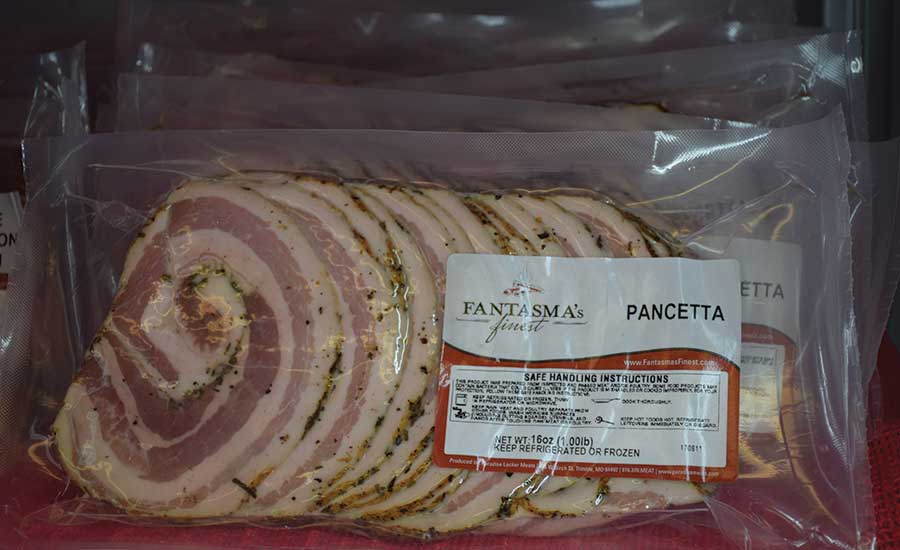Paradise Meats Farm to Fork Pork
A nationwide farm-to-fork program means that some of the country's most desirable, heritage-breed pork products comes through Paradise Locker Meats.


















Paradise Locker Meats has a history that dates back more than 70 years, but Paradise was almost paved over before the Fantasma family rescued it and turned it into one of the country’s premier small meat processors. Still, it wasn’t an easy process. The state of Missouri was ready to close down the facility… on Mario Fantasma’s second day of ownership. Nobody had told the county that the run-down building was under new management.
“I said, ‘Give me a couple of weeks, because I just bought it.’ We cleaned it up pretty good and got rid of all the junk,” Mario recalls. When the county officials came back a couple of weeks later, they told him to keep up the good work and left.
Mario Fantasma, along with his wife Teresa and sons Louis and Nicholas, has run Paradise Locker since 1995. From that rough start and a subsequent fire that necessitated a move from Paradise, Mo. to nearby Trimble, the company has been in a state of growth and evolution. It started as a processor of custom exempt meats and deer during hunting season. Today, the company has a line of retail products called Fantasma’s Finest, which is gaining brand awareness in the Kansas City area. It also has a farm-to-fork program that supplies natural pork from heritage breeds to discerning customers around the country.
The fresh pork program helped transform Paradise Locker from a state-inspected facility to a USDA plant in 2004.
“We talked with a client out in New York, which we’re still working with today. We started off with supplying 20 pigs for him for his mail-order customers,” Mario says.
Those 20 pigs turned into 40, and then 60, and then 80, and soon Paradise Meats had to expand its facility to accommodate all of the animals that needed processing. Along with pigs for its customer in New York and animals for area farmers, the company also has its own fresh pork program and distributes to customers and further processors across the country.
“The expansion that we did here recently allowed us to expand on what already made us successful and gave us room to grow other areas as well,” Louis explains. “It allowed us to run our kill floor five days a week, and it allowed us a lot of new room to grow our smoked meats and further processed business. Both of those were needed to make it work.”
Paradise Meats is an incredibly multi-faceted company, selling its fresh and smoked meat products through its retail store, its website, private labeling and some retail locations in the area. It slaughters about 270 to 300 animals per week, mostly hogs, for its own Paradise Meats’ line, its New York-based customer, Heritage Foods USA, and other local farmers. The company is active in both the Missouri Association of Meat Processors (MAMP) and the American Association of Meat Processors (AAMP), and its cured meat products have won many awards in the state and national competitions. The company recently hosted an open house for about 80 MAMP members as part of a state bus tour.
The MAMP annual conventions, and its meat competitions, helped spur Paradise Meats into expanding its retail options in the first place, after entering products into the competition in 2006.
“It’s such a great organization, and that kind of fueled us to understand that we can produce products that were pretty original,” Mario says. “With working on preparing products for shows, it helped us to understand what our potential was for the retail side.”
Fantasma's Finest
Paradise Meats’ retail presence has steadily expanded from a retail freezer to a fully stocked store. As more and more shoppers in the Kansas City area — and more from outside the area — discovered the products, the Fantasmas decided to take the next step and branded their products. The company’s snack sticks are sold in some retail locations outside of the company’s store, and expanding its retail presence is a future goal.
“We really felt we needed to put a name to that product and develop a brand that we as a family could stand behind and support, that we could start to build a little more on a higher-end retail side,” Nick explains.
“We had a whole board of names and ideas written down, and fortunately, my idea won!” Mario says of the decision-making process behind Fantasma’s Finest.
At least the label creation came easier than naming the brand. Brian Fantasma, a nephew of Mario and Teresa, has a graphic design business in Kansas City called Fantasma Imagery. He put together the concept for the labels, the logo, the materials used in the company’s gift boxes and its website.
The process in developing the branding concept and the labeling involved, Louis quips, “a lot of cussin’ and discussin’. As a family, everything is a decision by committee, but the best of all of us came out of that and we figured out where we wanted to be.”
All four of the Fantasma family members are involved in the management of the business. Louis is the plant operations manager and makes the decisions about the shop floor and personnel. He also works with the company’s distributors and farmers and does product development. Nick oversees the retail store, the website and its mail order business. He also develops ads and runs the social media channels. Teresa is the chief financial officer and handles all finances. Mario is the CEO and says that his main job is to provide support for Louis and Nick, on any decisions.
“My hours have been cut; they didn’t want to pay me anymore,” he adds with a chuckle. “I spent 40 years in this industry, so when it comes to helping with conventions or if we need to talk to a new customer, I’ll be involved at some point. Basically I’m here to support what they’re doing in this plant.”
Paradise Meats’ online store allows people from across the country to try the company’s award-winning sausages, ham, bacon and barbecue products. The Fantasmas also work with a local home delivery service to reach out to Kansas City consumers. Shatto is a glass-bottle milk company that specializes in hormone-free dairy products. It started a home delivery service and invited local companies to add their products to complement the dairy products.
“Shatto brought back the milkman,” Mario marvels. “You hadn’t heard of that in years, the guy bringing you the milk, setting it on your porch and then going on. How neat is it that they invited the local companies around the Kansas City area to provide them products to do home delivery.”
That trend toward local agriculture is popular in Kansas City, and Paradise Meats’ slaughter services have grown as a result of it. The company’s private label program has allowed many area farmers to develop their own line of products, which they can sell through farmers markets or other means.
“All these small private labels, we’ve helped all these people grow their business,” Teresa says. “You really feel like you’re part of the process of helping them grow.”
Farmers have come to trust Paradise Meats for its slaughter abilities, as humane handling is an important consumer concern when it comes to fresh meats. Those farmers are not the commercial farmers with thousands of Yorkshire pigs in indoor houses. These animals are free to roam outside and include Red Wattle, Berkshire and other heritage breeds.
“If there’s a rare pig breed that exists, we’ve done it. It’s come through this plant,” Louis notes.
Through the connections that Paradise Meats has developed and the ones that its New York customer has provided, the company has access to a large network of pigs that are Midwest in origin, raised outdoors, fed a natural diet and are uncommon breeds. Those are all positive attributes for the end customer, who is looking for something a little out of the ordinary. Paradise Meats goes a step further by labeling each cut with the farm that produced the pig. Restaurants and further processors are then able to specify pork from a particular farm or farms that meet their needs.
Unlike other programs where carcasses are cut uniformly and packaged cuts are sent to distributors to sell, Paradise Meats runs its own fresh pork program differently.
“Everything is cut to order off the animals, and it’s all sold prior to being cut,” Louis explains. “We get our orders and then cut to spec, and that commitment to being able to do specialized cuts and taking care of those high-end customers has made them successful, and helped make us successful as well.”
The expansion, which doubled the size of the facility to over 20,000 square feet and increased the workforce to 37 employees, made further improvements to the slaughter operations. The increased space allowed slaughter to be done five days a week instead of three, and improvements to the chillers helps maintain the quality of the meat. Unlike some companies that have discontinued slaughter operations, Paradise Meats is not hurting for customers.
Along with the opportunity that the slaughter operations bring, there is a sense of responsibility. Paradise Meats has been around since 1946. Even though it has changed hands and moved to Trimble, there are still farmers in the area who have been using its services for multiple generations, and that need for a local butcher is strong. The agreement with the New York company came about much the same way. The mission of the customer matched the mission of the family, Teresa says.
“There is no other slaughterhouse that we knew of that wanted to butcher a heritage breed like Duroc where you can’t even get the hair off of them — they’re like little bears in the winter!” she exclaims.
Much like Shatto’s has brought back the milkman, Paradise Meats is maintaining the tradition of the local butcher shop which, thanks to consumer trends, is in vogue again.
“We’ve found this to be a niche, and we can say that 100% of our pork products are naturally raised, they’re all outdoor raised animals, and they’re all heritage breeds. We feel that that part of it is a marketing tool for our company to proceed in the future,” Mario says.
Nick points out that the company’s longtime slogan was “The Cutting Edge of Meats.” Paradise Locker remains on the cutting edge, not necessarily by being high-tech, but by being aware of what the consumers want and meeting those wants.
“Look how far the industry’s come, that if you have a big enough following of people that are saying, ‘This is what we want our food to be,’ it’s causing billion-dollar corporations to make a turn and go in a little different direction than they were headed,” he says. “It’s a really cool time to be in the meat industry.”
Looking for a reprint of this article?
From high-res PDFs to custom plaques, order your copy today!















